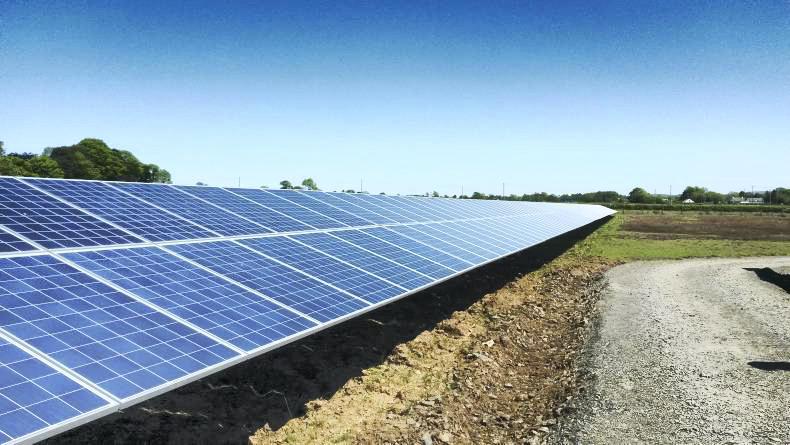Minister for the Environment Denis Naughten’s comment ruling out small-scale projects from the upcoming Renewable Heat Incentive (RHI) is at odds with last week’s IFA submission to the RHI public consultation.
“It is essential that the scheme is accessible to small-scale projects,” the IFA submission reads, calling for a percentage of the RHI budget to be ring-fenced for agricultural and community-based projects with direct shareholding by the local population. “We have to support farm-scale renewable energy development. It hasn’t been happening nearly enough in this country,” IFA renewables project chair James Murphy told the Irish Farmers Journal.
With on-farm biomass boilers and anaerobic digestors now unlikely to get critical RHI support, attention will turn to other options, with solar still attracting many developers keen to sign options or leases with farmers for access to their land. This is despite the Government’s clarification last year that such land would lose its agricultural tax relief. Murphy argues this should be reversed and farm payments maintained on solar farms, where “70% of the land is still grazable for sheep”. Solid advice is essential before signing any such deal.
Michael Quirk, a tillage farmer in Aghada, Co Cork, has two functioning wind turbines and planning permission for a solar farm on his 120ac of land. He said accessing the national grid was his main challenge. “I sent my grid application in 2015. I think I’m 20th on the list in the country, but still I’m looking at a long wait for process and connection, maybe up to 2020 at pretty high cost,” he said.
Listen to an interview with Michael Quirk in our podcast below:
Listen to "Cork farmer on trying to start a solar farm" on Spreaker.
An ESB spokesperson told the Irish Farmers Journal 509 solar grid applications are in the queue, accounting for a massive 3.7GW capacity. No average connection time is available because of the factors involved. Michael acknowledged “huge uncertainty” in his project. By the time he gets connected, the cost of solar panels may change dramatically depending on EU import duties and the price paid for his electricity under new incentives is not yet known.
Michael is hoping for a 10-12c/kWh feed-in tariff, similar to the rates currently paid for electricity from biomass under the latest REFIT3 scheme, which closed to new entrants in December 2015.
Read more
Renewable energy incentives to target large users – Naughten
Full coverage: renewable energy
Minister for the Environment Denis Naughten’s comment ruling out small-scale projects from the upcoming Renewable Heat Incentive (RHI) is at odds with last week’s IFA submission to the RHI public consultation.
“It is essential that the scheme is accessible to small-scale projects,” the IFA submission reads, calling for a percentage of the RHI budget to be ring-fenced for agricultural and community-based projects with direct shareholding by the local population. “We have to support farm-scale renewable energy development. It hasn’t been happening nearly enough in this country,” IFA renewables project chair James Murphy told the Irish Farmers Journal.
With on-farm biomass boilers and anaerobic digestors now unlikely to get critical RHI support, attention will turn to other options, with solar still attracting many developers keen to sign options or leases with farmers for access to their land. This is despite the Government’s clarification last year that such land would lose its agricultural tax relief. Murphy argues this should be reversed and farm payments maintained on solar farms, where “70% of the land is still grazable for sheep”. Solid advice is essential before signing any such deal.
Michael Quirk, a tillage farmer in Aghada, Co Cork, has two functioning wind turbines and planning permission for a solar farm on his 120ac of land. He said accessing the national grid was his main challenge. “I sent my grid application in 2015. I think I’m 20th on the list in the country, but still I’m looking at a long wait for process and connection, maybe up to 2020 at pretty high cost,” he said.
Listen to an interview with Michael Quirk in our podcast below:
Listen to "Cork farmer on trying to start a solar farm" on Spreaker.
An ESB spokesperson told the Irish Farmers Journal 509 solar grid applications are in the queue, accounting for a massive 3.7GW capacity. No average connection time is available because of the factors involved. Michael acknowledged “huge uncertainty” in his project. By the time he gets connected, the cost of solar panels may change dramatically depending on EU import duties and the price paid for his electricity under new incentives is not yet known.
Michael is hoping for a 10-12c/kWh feed-in tariff, similar to the rates currently paid for electricity from biomass under the latest REFIT3 scheme, which closed to new entrants in December 2015.
Read more
Renewable energy incentives to target large users – Naughten
Full coverage: renewable energy






 This is a subscriber-only article
This is a subscriber-only article










SHARING OPTIONS: